Evaluating the Impact of HRM Practices in Nepal Civil Service
VerifiedAdded on 2019/12/03
|8
|3341
|306
Report
AI Summary
This research proposal investigates the impact of Human Resource Management (HRM) practices on the reorganization and performance of the civil service in Nepal, focusing on workforce motivation and reward mechanisms. The study employs the incentive theory of motivation to analyze the current state of civil service in Nepal, considering the country's history of political instability and inflexible working practices. The research plan includes a Gantt chart outlining the stages, from proposal submission to project finalization. Data collection methods involve interviews with civil service executives and surveys of employees to gather both qualitative and quantitative data on HRM practices, reward systems, and employee perspectives. The data analysis will utilize SPSS and thematic analysis to identify issues and evaluate the effectiveness of current HR policies, aiming to provide insights for result-oriented civil service reforms. The research acknowledges potential risks, such as access to senior executives and confidentiality concerns, and outlines mitigation strategies. The study aligns with ethical guidelines and academic standards, with the researcher's background in Nepal providing cultural familiarity. References cited support the theoretical framework and context of the research.
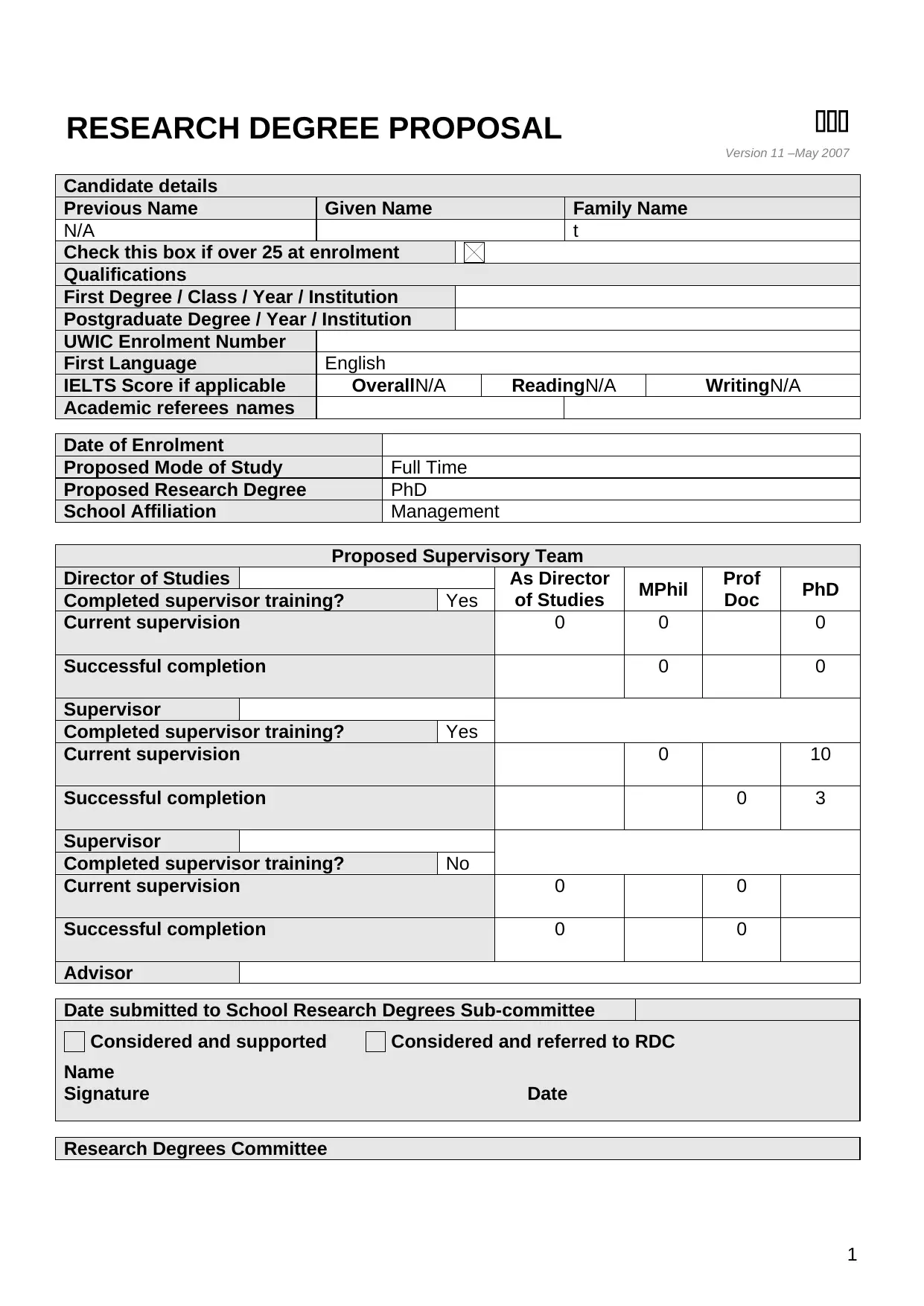
RESEARCH DEGREE PROPOSAL
Version 11 –May 2007
Candidate details
Previous Name Given Name Family Name
N/A t
Check this box if over 25 at enrolment
Qualifications
First Degree / Class / Year / Institution
Postgraduate Degree / Year / Institution
UWIC Enrolment Number
First Language English
IELTS Score if applicable OverallN/A ReadingN/A WritingN/A
Academic referees names
Date of Enrolment
Proposed Mode of Study Full Time
Proposed Research Degree PhD
School Affiliation Management
Proposed Supervisory Team
Director of Studies As Director
of Studies MPhil Prof
Doc PhD
Completed supervisor training? Yes
Current supervision 0 0 0
Successful completion 0 0
Supervisor
Completed supervisor training? Yes
Current supervision 0 10
Successful completion 0 3
Supervisor
Completed supervisor training? No
Current supervision 0 0
Successful completion 0 0
Advisor
Date submitted to School Research Degrees Sub-committee
Considered and supported Considered and referred to RDC
Name
Signature Date
Research Degrees Committee
1
Version 11 –May 2007
Candidate details
Previous Name Given Name Family Name
N/A t
Check this box if over 25 at enrolment
Qualifications
First Degree / Class / Year / Institution
Postgraduate Degree / Year / Institution
UWIC Enrolment Number
First Language English
IELTS Score if applicable OverallN/A ReadingN/A WritingN/A
Academic referees names
Date of Enrolment
Proposed Mode of Study Full Time
Proposed Research Degree PhD
School Affiliation Management
Proposed Supervisory Team
Director of Studies As Director
of Studies MPhil Prof
Doc PhD
Completed supervisor training? Yes
Current supervision 0 0 0
Successful completion 0 0
Supervisor
Completed supervisor training? Yes
Current supervision 0 10
Successful completion 0 3
Supervisor
Completed supervisor training? No
Current supervision 0 0
Successful completion 0 0
Advisor
Date submitted to School Research Degrees Sub-committee
Considered and supported Considered and referred to RDC
Name
Signature Date
Research Degrees Committee
1
Paraphrase This Document
Need a fresh take? Get an instant paraphrase of this document with our AI Paraphraser
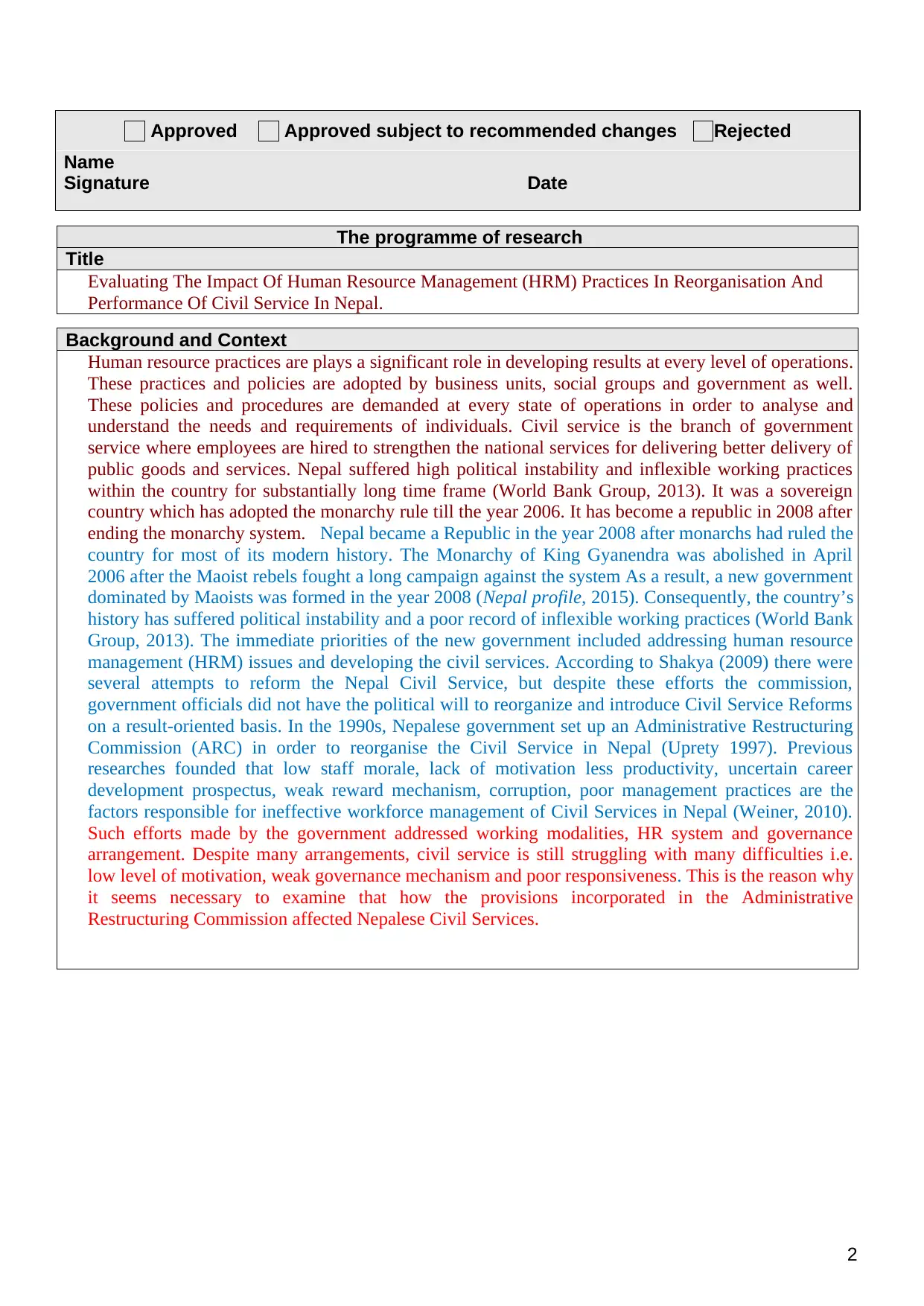
Approved Approved subject to recommended changes Rejected
Name
Signature Date
2
The programme of research
Title
Evaluating The Impact Of Human Resource Management (HRM) Practices In Reorganisation And
Performance Of Civil Service In Nepal.
Background and Context
Human resource practices are plays a significant role in developing results at every level of operations.
These practices and policies are adopted by business units, social groups and government as well.
These policies and procedures are demanded at every state of operations in order to analyse and
understand the needs and requirements of individuals. Civil service is the branch of government
service where employees are hired to strengthen the national services for delivering better delivery of
public goods and services. Nepal suffered high political instability and inflexible working practices
within the country for substantially long time frame (World Bank Group, 2013). It was a sovereign
country which has adopted the monarchy rule till the year 2006. It has become a republic in 2008 after
ending the monarchy system. Nepal became a Republic in the year 2008 after monarchs had ruled the
country for most of its modern history. The Monarchy of King Gyanendra was abolished in April
2006 after the Maoist rebels fought a long campaign against the system As a result, a new government
dominated by Maoists was formed in the year 2008 (Nepal profile, 2015). Consequently, the country’s
history has suffered political instability and a poor record of inflexible working practices (World Bank
Group, 2013). The immediate priorities of the new government included addressing human resource
management (HRM) issues and developing the civil services. According to Shakya (2009) there were
several attempts to reform the Nepal Civil Service, but despite these efforts the commission,
government officials did not have the political will to reorganize and introduce Civil Service Reforms
on a result-oriented basis. In the 1990s, Nepalese government set up an Administrative Restructuring
Commission (ARC) in order to reorganise the Civil Service in Nepal (Uprety 1997). Previous
researches founded that low staff morale, lack of motivation less productivity, uncertain career
development prospectus, weak reward mechanism, corruption, poor management practices are the
factors responsible for ineffective workforce management of Civil Services in Nepal (Weiner, 2010).
Such efforts made by the government addressed working modalities, HR system and governance
arrangement. Despite many arrangements, civil service is still struggling with many difficulties i.e.
low level of motivation, weak governance mechanism and poor responsiveness. This is the reason why
it seems necessary to examine that how the provisions incorporated in the Administrative
Restructuring Commission affected Nepalese Civil Services.
Name
Signature Date
2
The programme of research
Title
Evaluating The Impact Of Human Resource Management (HRM) Practices In Reorganisation And
Performance Of Civil Service In Nepal.
Background and Context
Human resource practices are plays a significant role in developing results at every level of operations.
These practices and policies are adopted by business units, social groups and government as well.
These policies and procedures are demanded at every state of operations in order to analyse and
understand the needs and requirements of individuals. Civil service is the branch of government
service where employees are hired to strengthen the national services for delivering better delivery of
public goods and services. Nepal suffered high political instability and inflexible working practices
within the country for substantially long time frame (World Bank Group, 2013). It was a sovereign
country which has adopted the monarchy rule till the year 2006. It has become a republic in 2008 after
ending the monarchy system. Nepal became a Republic in the year 2008 after monarchs had ruled the
country for most of its modern history. The Monarchy of King Gyanendra was abolished in April
2006 after the Maoist rebels fought a long campaign against the system As a result, a new government
dominated by Maoists was formed in the year 2008 (Nepal profile, 2015). Consequently, the country’s
history has suffered political instability and a poor record of inflexible working practices (World Bank
Group, 2013). The immediate priorities of the new government included addressing human resource
management (HRM) issues and developing the civil services. According to Shakya (2009) there were
several attempts to reform the Nepal Civil Service, but despite these efforts the commission,
government officials did not have the political will to reorganize and introduce Civil Service Reforms
on a result-oriented basis. In the 1990s, Nepalese government set up an Administrative Restructuring
Commission (ARC) in order to reorganise the Civil Service in Nepal (Uprety 1997). Previous
researches founded that low staff morale, lack of motivation less productivity, uncertain career
development prospectus, weak reward mechanism, corruption, poor management practices are the
factors responsible for ineffective workforce management of Civil Services in Nepal (Weiner, 2010).
Such efforts made by the government addressed working modalities, HR system and governance
arrangement. Despite many arrangements, civil service is still struggling with many difficulties i.e.
low level of motivation, weak governance mechanism and poor responsiveness. This is the reason why
it seems necessary to examine that how the provisions incorporated in the Administrative
Restructuring Commission affected Nepalese Civil Services.
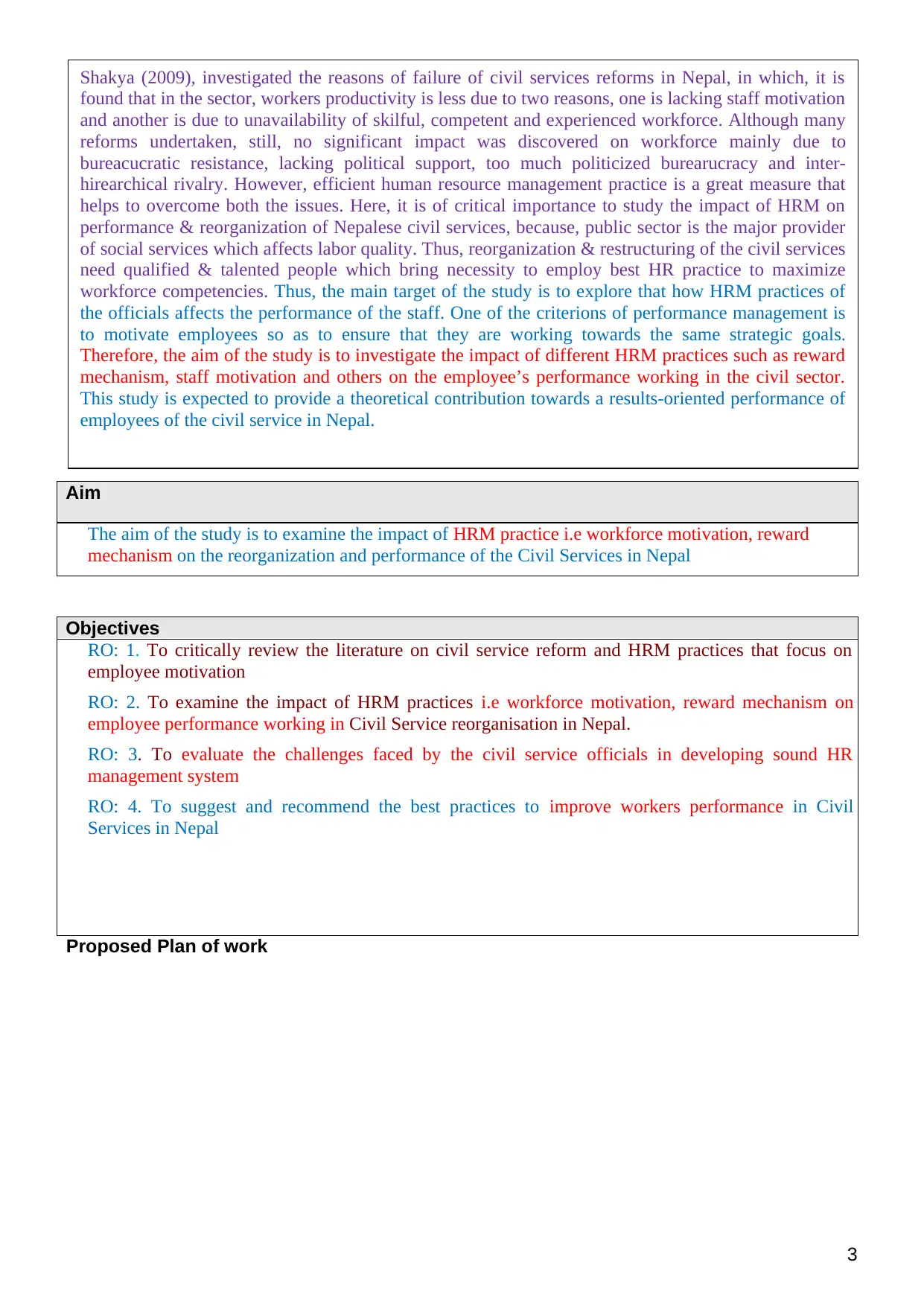
Proposed Plan of work
3
Aim
The aim of the study is to examine the impact of HRM practice i.e workforce motivation, reward
mechanism on the reorganization and performance of the Civil Services in Nepal
Objectives
RO: 1. To critically review the literature on civil service reform and HRM practices that focus on
employee motivation
RO: 2. To examine the impact of HRM practices i.e workforce motivation, reward mechanism on
employee performance working in Civil Service reorganisation in Nepal.
RO: 3. To evaluate the challenges faced by the civil service officials in developing sound HR
management system
RO: 4. To suggest and recommend the best practices to improve workers performance in Civil
Services in Nepal
Shakya (2009), investigated the reasons of failure of civil services reforms in Nepal, in which, it is
found that in the sector, workers productivity is less due to two reasons, one is lacking staff motivation
and another is due to unavailability of skilful, competent and experienced workforce. Although many
reforms undertaken, still, no significant impact was discovered on workforce mainly due to
bureacucratic resistance, lacking political support, too much politicized burearucracy and inter-
hirearchical rivalry. However, efficient human resource management practice is a great measure that
helps to overcome both the issues. Here, it is of critical importance to study the impact of HRM on
performance & reorganization of Nepalese civil services, because, public sector is the major provider
of social services which affects labor quality. Thus, reorganization & restructuring of the civil services
need qualified & talented people which bring necessity to employ best HR practice to maximize
workforce competencies. Thus, the main target of the study is to explore that how HRM practices of
the officials affects the performance of the staff. One of the criterions of performance management is
to motivate employees so as to ensure that they are working towards the same strategic goals.
Therefore, the aim of the study is to investigate the impact of different HRM practices such as reward
mechanism, staff motivation and others on the employee’s performance working in the civil sector.
This study is expected to provide a theoretical contribution towards a results-oriented performance of
employees of the civil service in Nepal.
3
Aim
The aim of the study is to examine the impact of HRM practice i.e workforce motivation, reward
mechanism on the reorganization and performance of the Civil Services in Nepal
Objectives
RO: 1. To critically review the literature on civil service reform and HRM practices that focus on
employee motivation
RO: 2. To examine the impact of HRM practices i.e workforce motivation, reward mechanism on
employee performance working in Civil Service reorganisation in Nepal.
RO: 3. To evaluate the challenges faced by the civil service officials in developing sound HR
management system
RO: 4. To suggest and recommend the best practices to improve workers performance in Civil
Services in Nepal
Shakya (2009), investigated the reasons of failure of civil services reforms in Nepal, in which, it is
found that in the sector, workers productivity is less due to two reasons, one is lacking staff motivation
and another is due to unavailability of skilful, competent and experienced workforce. Although many
reforms undertaken, still, no significant impact was discovered on workforce mainly due to
bureacucratic resistance, lacking political support, too much politicized burearucracy and inter-
hirearchical rivalry. However, efficient human resource management practice is a great measure that
helps to overcome both the issues. Here, it is of critical importance to study the impact of HRM on
performance & reorganization of Nepalese civil services, because, public sector is the major provider
of social services which affects labor quality. Thus, reorganization & restructuring of the civil services
need qualified & talented people which bring necessity to employ best HR practice to maximize
workforce competencies. Thus, the main target of the study is to explore that how HRM practices of
the officials affects the performance of the staff. One of the criterions of performance management is
to motivate employees so as to ensure that they are working towards the same strategic goals.
Therefore, the aim of the study is to investigate the impact of different HRM practices such as reward
mechanism, staff motivation and others on the employee’s performance working in the civil sector.
This study is expected to provide a theoretical contribution towards a results-oriented performance of
employees of the civil service in Nepal.
⊘ This is a preview!⊘
Do you want full access?
Subscribe today to unlock all pages.

Trusted by 1+ million students worldwide
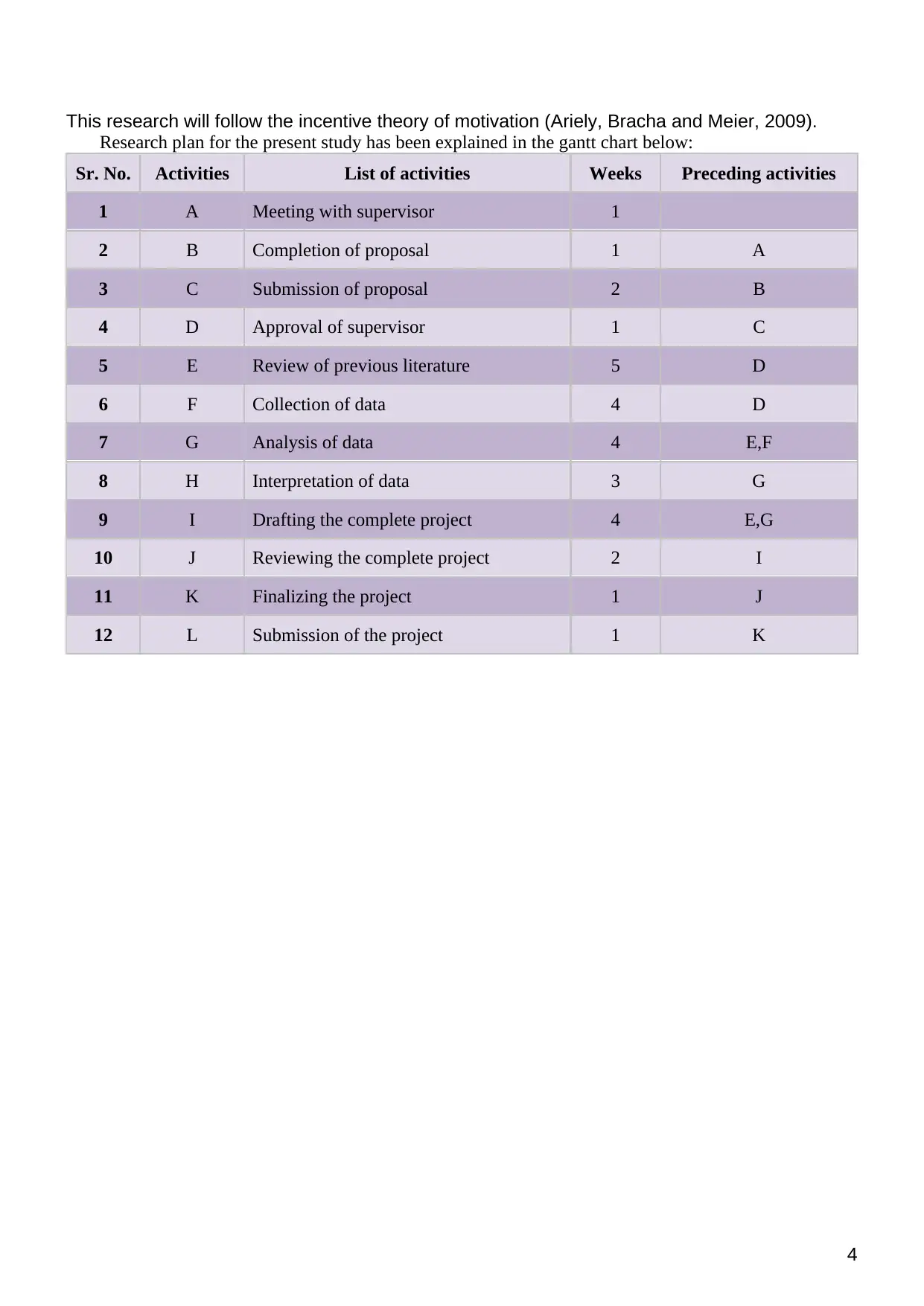
This research will follow the incentive theory of motivation (Ariely, Bracha and Meier, 2009).
Research plan for the present study has been explained in the gantt chart below:
Sr. No. Activities List of activities Weeks Preceding activities
1 A Meeting with supervisor 1
2 B Completion of proposal 1 A
3 C Submission of proposal 2 B
4 D Approval of supervisor 1 C
5 E Review of previous literature 5 D
6 F Collection of data 4 D
7 G Analysis of data 4 E,F
8 H Interpretation of data 3 G
9 I Drafting the complete project 4 E,G
10 J Reviewing the complete project 2 I
11 K Finalizing the project 1 J
12 L Submission of the project 1 K
4
Research plan for the present study has been explained in the gantt chart below:
Sr. No. Activities List of activities Weeks Preceding activities
1 A Meeting with supervisor 1
2 B Completion of proposal 1 A
3 C Submission of proposal 2 B
4 D Approval of supervisor 1 C
5 E Review of previous literature 5 D
6 F Collection of data 4 D
7 G Analysis of data 4 E,F
8 H Interpretation of data 3 G
9 I Drafting the complete project 4 E,G
10 J Reviewing the complete project 2 I
11 K Finalizing the project 1 J
12 L Submission of the project 1 K
4
Paraphrase This Document
Need a fresh take? Get an instant paraphrase of this document with our AI Paraphraser
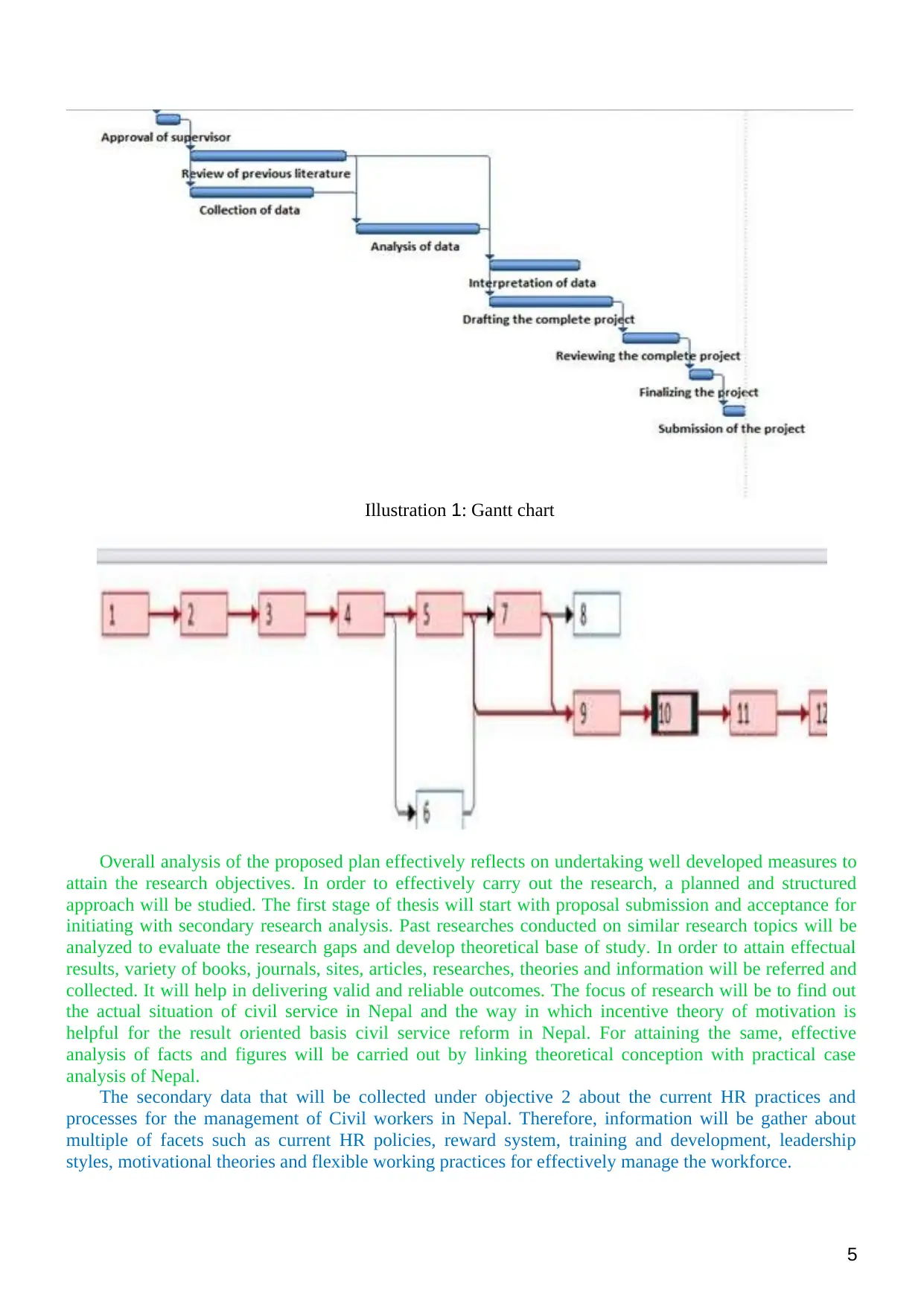
Illustration 1: Gantt chart
Overall analysis of the proposed plan effectively reflects on undertaking well developed measures to
attain the research objectives. In order to effectively carry out the research, a planned and structured
approach will be studied. The first stage of thesis will start with proposal submission and acceptance for
initiating with secondary research analysis. Past researches conducted on similar research topics will be
analyzed to evaluate the research gaps and develop theoretical base of study. In order to attain effectual
results, variety of books, journals, sites, articles, researches, theories and information will be referred and
collected. It will help in delivering valid and reliable outcomes. The focus of research will be to find out
the actual situation of civil service in Nepal and the way in which incentive theory of motivation is
helpful for the result oriented basis civil service reform in Nepal. For attaining the same, effective
analysis of facts and figures will be carried out by linking theoretical conception with practical case
analysis of Nepal.
The secondary data that will be collected under objective 2 about the current HR practices and
processes for the management of Civil workers in Nepal. Therefore, information will be gather about
multiple of facets such as current HR policies, reward system, training and development, leadership
styles, motivational theories and flexible working practices for effectively manage the workforce.
5
Overall analysis of the proposed plan effectively reflects on undertaking well developed measures to
attain the research objectives. In order to effectively carry out the research, a planned and structured
approach will be studied. The first stage of thesis will start with proposal submission and acceptance for
initiating with secondary research analysis. Past researches conducted on similar research topics will be
analyzed to evaluate the research gaps and develop theoretical base of study. In order to attain effectual
results, variety of books, journals, sites, articles, researches, theories and information will be referred and
collected. It will help in delivering valid and reliable outcomes. The focus of research will be to find out
the actual situation of civil service in Nepal and the way in which incentive theory of motivation is
helpful for the result oriented basis civil service reform in Nepal. For attaining the same, effective
analysis of facts and figures will be carried out by linking theoretical conception with practical case
analysis of Nepal.
The secondary data that will be collected under objective 2 about the current HR practices and
processes for the management of Civil workers in Nepal. Therefore, information will be gather about
multiple of facets such as current HR policies, reward system, training and development, leadership
styles, motivational theories and flexible working practices for effectively manage the workforce.
5
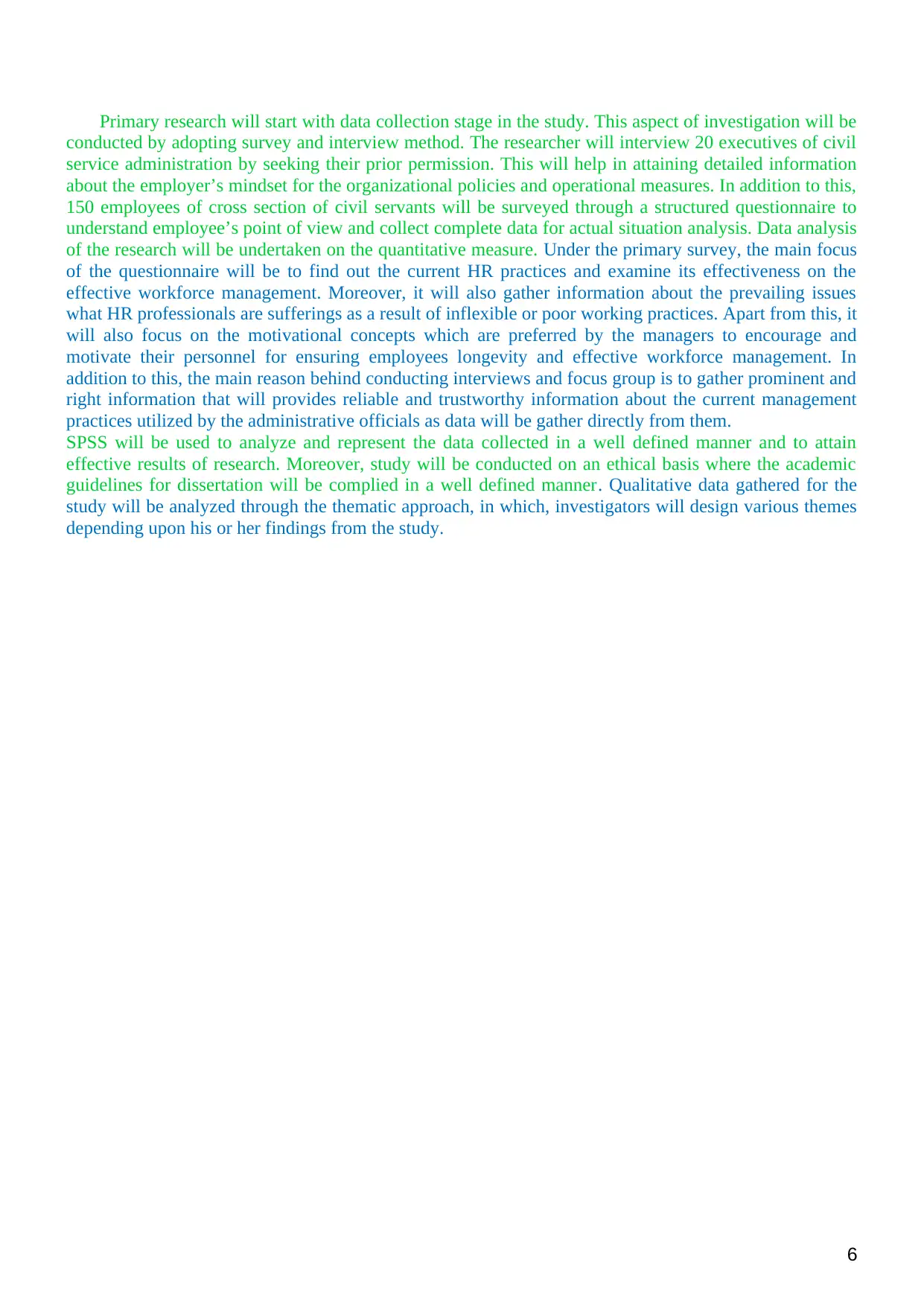
Primary research will start with data collection stage in the study. This aspect of investigation will be
conducted by adopting survey and interview method. The researcher will interview 20 executives of civil
service administration by seeking their prior permission. This will help in attaining detailed information
about the employer’s mindset for the organizational policies and operational measures. In addition to this,
150 employees of cross section of civil servants will be surveyed through a structured questionnaire to
understand employee’s point of view and collect complete data for actual situation analysis. Data analysis
of the research will be undertaken on the quantitative measure. Under the primary survey, the main focus
of the questionnaire will be to find out the current HR practices and examine its effectiveness on the
effective workforce management. Moreover, it will also gather information about the prevailing issues
what HR professionals are sufferings as a result of inflexible or poor working practices. Apart from this, it
will also focus on the motivational concepts which are preferred by the managers to encourage and
motivate their personnel for ensuring employees longevity and effective workforce management. In
addition to this, the main reason behind conducting interviews and focus group is to gather prominent and
right information that will provides reliable and trustworthy information about the current management
practices utilized by the administrative officials as data will be gather directly from them.
SPSS will be used to analyze and represent the data collected in a well defined manner and to attain
effective results of research. Moreover, study will be conducted on an ethical basis where the academic
guidelines for dissertation will be complied in a well defined manner. Qualitative data gathered for the
study will be analyzed through the thematic approach, in which, investigators will design various themes
depending upon his or her findings from the study.
6
conducted by adopting survey and interview method. The researcher will interview 20 executives of civil
service administration by seeking their prior permission. This will help in attaining detailed information
about the employer’s mindset for the organizational policies and operational measures. In addition to this,
150 employees of cross section of civil servants will be surveyed through a structured questionnaire to
understand employee’s point of view and collect complete data for actual situation analysis. Data analysis
of the research will be undertaken on the quantitative measure. Under the primary survey, the main focus
of the questionnaire will be to find out the current HR practices and examine its effectiveness on the
effective workforce management. Moreover, it will also gather information about the prevailing issues
what HR professionals are sufferings as a result of inflexible or poor working practices. Apart from this, it
will also focus on the motivational concepts which are preferred by the managers to encourage and
motivate their personnel for ensuring employees longevity and effective workforce management. In
addition to this, the main reason behind conducting interviews and focus group is to gather prominent and
right information that will provides reliable and trustworthy information about the current management
practices utilized by the administrative officials as data will be gather directly from them.
SPSS will be used to analyze and represent the data collected in a well defined manner and to attain
effective results of research. Moreover, study will be conducted on an ethical basis where the academic
guidelines for dissertation will be complied in a well defined manner. Qualitative data gathered for the
study will be analyzed through the thematic approach, in which, investigators will design various themes
depending upon his or her findings from the study.
6
⊘ This is a preview!⊘
Do you want full access?
Subscribe today to unlock all pages.

Trusted by 1+ million students worldwide
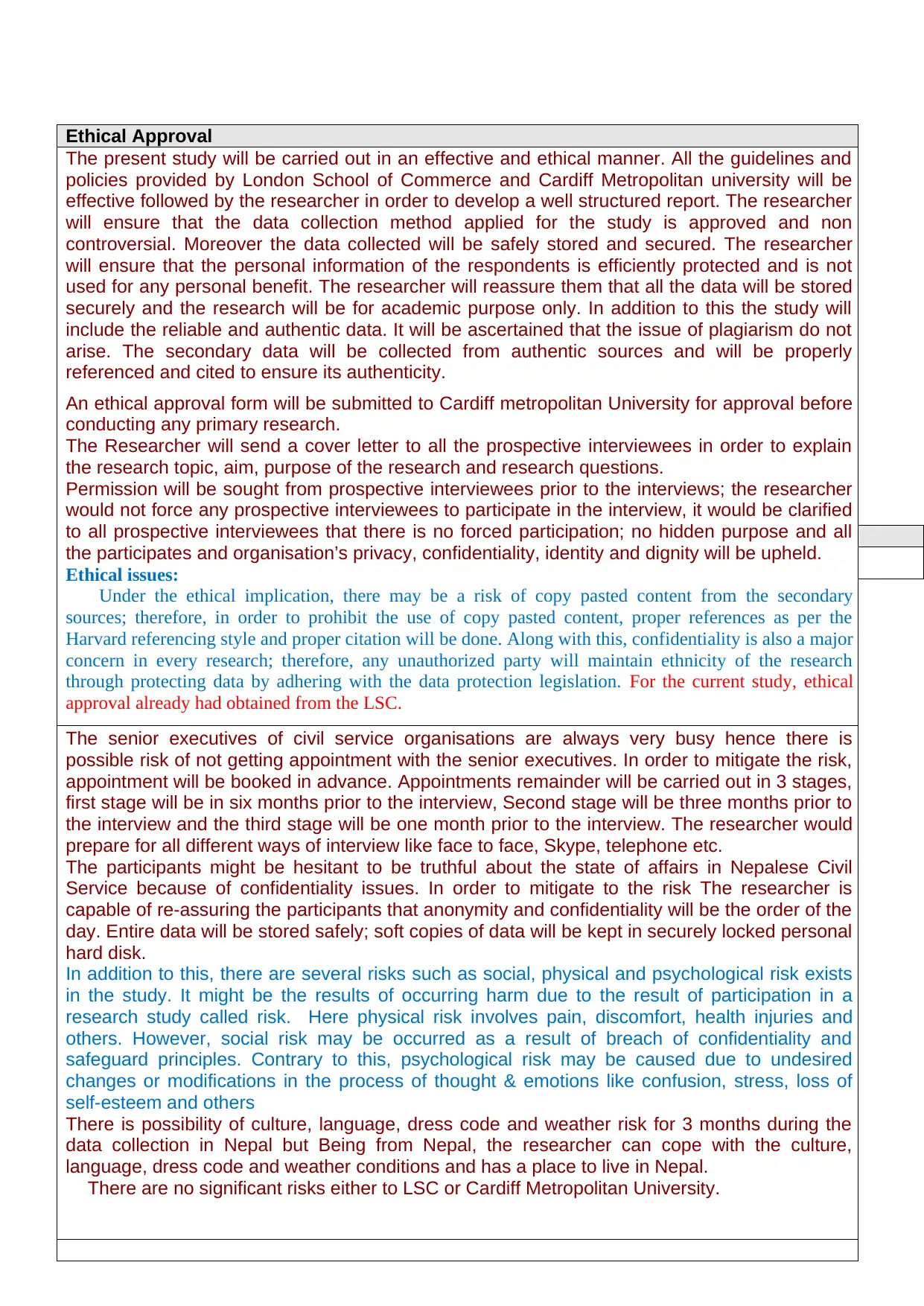
7
Risk Assessment
A Risk assessment will be done and risk management will be implemented at each stage of the
research process.
A few risks have been identified:
The senior executives of civil service organisations are always very busy hence there is
possible risk of not getting appointment with the senior executives. In order to mitigate the risk,
appointment will be booked in advance. Appointments remainder will be carried out in 3 stages,
first stage will be in six months prior to the interview, Second stage will be three months prior to
the interview and the third stage will be one month prior to the interview. The researcher would
prepare for all different ways of interview like face to face, Skype, telephone etc.
The participants might be hesitant to be truthful about the state of affairs in Nepalese Civil
Service because of confidentiality issues. In order to mitigate to the risk The researcher is
capable of re-assuring the participants that anonymity and confidentiality will be the order of the
day. Entire data will be stored safely; soft copies of data will be kept in securely locked personal
hard disk.
In addition to this, there are several risks such as social, physical and psychological risk exists
in the study. It might be the results of occurring harm due to the result of participation in a
research study called risk. Here physical risk involves pain, discomfort, health injuries and
others. However, social risk may be occurred as a result of breach of confidentiality and
safeguard principles. Contrary to this, psychological risk may be caused due to undesired
changes or modifications in the process of thought & emotions like confusion, stress, loss of
self-esteem and others
There is possibility of culture, language, dress code and weather risk for 3 months during the
data collection in Nepal but Being from Nepal, the researcher can cope with the culture,
language, dress code and weather conditions and has a place to live in Nepal.
There are no significant risks either to LSC or Cardiff Metropolitan University.
References Cited
Ariely, D., Bracha, A. and Meier, S., 2009. Doing good or doing well? Image motivation and
monetary incentives in behaving prosocially. The American Economic Review. pp. 544-555.
Kim, S. and Vandenabeele, W., (2010). A strategy for building public service motivation
research internationally. Public administration review, 70(5). pp. 701-709.
Nepal profile. 2015. [Online]. Available through: <http://www.bbc.com/news/world-south-asia-
12511455>. [Accessed on 24th July 2015].
Pass S and Hyde P (2005) HRM or people management; What does it say on the Tin?
Management Research News, 28 (9).
Shakya, R. K. (2009). Why Civil Service Reforms fail?–A Case of Nepal. Administration and
Management Review. 21(2).pp. 40-63.
Tiwari, M. N., (2009). Governance Reform in Political Transition: The Case of Nepal’s Civil
Service Reform. Nepalese Journal of Public Policy and Governance. 24(1). pp.1-27.
Uprety C R., (1997) Wielding the Bureaucracy for Results; Reorienting the Nepalese Civil
service.
World Bank Group, (2013) Governance and Public Sector Management in South Asia.
Indicate the anticipated development of the work to PhD level
N/A
Ethical Approval
The present study will be carried out in an effective and ethical manner. All the guidelines and
policies provided by London School of Commerce and Cardiff Metropolitan university will be
effective followed by the researcher in order to develop a well structured report. The researcher
will ensure that the data collection method applied for the study is approved and non
controversial. Moreover the data collected will be safely stored and secured. The researcher
will ensure that the personal information of the respondents is efficiently protected and is not
used for any personal benefit. The researcher will reassure them that all the data will be stored
securely and the research will be for academic purpose only. In addition to this the study will
include the reliable and authentic data. It will be ascertained that the issue of plagiarism do not
arise. The secondary data will be collected from authentic sources and will be properly
referenced and cited to ensure its authenticity.
An ethical approval form will be submitted to Cardiff metropolitan University for approval before
conducting any primary research.
The Researcher will send a cover letter to all the prospective interviewees in order to explain
the research topic, aim, purpose of the research and research questions.
Permission will be sought from prospective interviewees prior to the interviews; the researcher
would not force any prospective interviewees to participate in the interview, it would be clarified
to all prospective interviewees that there is no forced participation; no hidden purpose and all
the participates and organisation’s privacy, confidentiality, identity and dignity will be upheld.
Ethical issues:
Under the ethical implication, there may be a risk of copy pasted content from the secondary
sources; therefore, in order to prohibit the use of copy pasted content, proper references as per the
Harvard referencing style and proper citation will be done. Along with this, confidentiality is also a major
concern in every research; therefore, any unauthorized party will maintain ethnicity of the research
through protecting data by adhering with the data protection legislation. For the current study, ethical
approval already had obtained from the LSC.
Risk Assessment
A Risk assessment will be done and risk management will be implemented at each stage of the
research process.
A few risks have been identified:
The senior executives of civil service organisations are always very busy hence there is
possible risk of not getting appointment with the senior executives. In order to mitigate the risk,
appointment will be booked in advance. Appointments remainder will be carried out in 3 stages,
first stage will be in six months prior to the interview, Second stage will be three months prior to
the interview and the third stage will be one month prior to the interview. The researcher would
prepare for all different ways of interview like face to face, Skype, telephone etc.
The participants might be hesitant to be truthful about the state of affairs in Nepalese Civil
Service because of confidentiality issues. In order to mitigate to the risk The researcher is
capable of re-assuring the participants that anonymity and confidentiality will be the order of the
day. Entire data will be stored safely; soft copies of data will be kept in securely locked personal
hard disk.
In addition to this, there are several risks such as social, physical and psychological risk exists
in the study. It might be the results of occurring harm due to the result of participation in a
research study called risk. Here physical risk involves pain, discomfort, health injuries and
others. However, social risk may be occurred as a result of breach of confidentiality and
safeguard principles. Contrary to this, psychological risk may be caused due to undesired
changes or modifications in the process of thought & emotions like confusion, stress, loss of
self-esteem and others
There is possibility of culture, language, dress code and weather risk for 3 months during the
data collection in Nepal but Being from Nepal, the researcher can cope with the culture,
language, dress code and weather conditions and has a place to live in Nepal.
There are no significant risks either to LSC or Cardiff Metropolitan University.
References Cited
Ariely, D., Bracha, A. and Meier, S., 2009. Doing good or doing well? Image motivation and
monetary incentives in behaving prosocially. The American Economic Review. pp. 544-555.
Kim, S. and Vandenabeele, W., (2010). A strategy for building public service motivation
research internationally. Public administration review, 70(5). pp. 701-709.
Nepal profile. 2015. [Online]. Available through: <http://www.bbc.com/news/world-south-asia-
12511455>. [Accessed on 24th July 2015].
Pass S and Hyde P (2005) HRM or people management; What does it say on the Tin?
Management Research News, 28 (9).
Shakya, R. K. (2009). Why Civil Service Reforms fail?–A Case of Nepal. Administration and
Management Review. 21(2).pp. 40-63.
Tiwari, M. N., (2009). Governance Reform in Political Transition: The Case of Nepal’s Civil
Service Reform. Nepalese Journal of Public Policy and Governance. 24(1). pp.1-27.
Uprety C R., (1997) Wielding the Bureaucracy for Results; Reorienting the Nepalese Civil
service.
World Bank Group, (2013) Governance and Public Sector Management in South Asia.
Indicate the anticipated development of the work to PhD level
N/A
Ethical Approval
The present study will be carried out in an effective and ethical manner. All the guidelines and
policies provided by London School of Commerce and Cardiff Metropolitan university will be
effective followed by the researcher in order to develop a well structured report. The researcher
will ensure that the data collection method applied for the study is approved and non
controversial. Moreover the data collected will be safely stored and secured. The researcher
will ensure that the personal information of the respondents is efficiently protected and is not
used for any personal benefit. The researcher will reassure them that all the data will be stored
securely and the research will be for academic purpose only. In addition to this the study will
include the reliable and authentic data. It will be ascertained that the issue of plagiarism do not
arise. The secondary data will be collected from authentic sources and will be properly
referenced and cited to ensure its authenticity.
An ethical approval form will be submitted to Cardiff metropolitan University for approval before
conducting any primary research.
The Researcher will send a cover letter to all the prospective interviewees in order to explain
the research topic, aim, purpose of the research and research questions.
Permission will be sought from prospective interviewees prior to the interviews; the researcher
would not force any prospective interviewees to participate in the interview, it would be clarified
to all prospective interviewees that there is no forced participation; no hidden purpose and all
the participates and organisation’s privacy, confidentiality, identity and dignity will be upheld.
Ethical issues:
Under the ethical implication, there may be a risk of copy pasted content from the secondary
sources; therefore, in order to prohibit the use of copy pasted content, proper references as per the
Harvard referencing style and proper citation will be done. Along with this, confidentiality is also a major
concern in every research; therefore, any unauthorized party will maintain ethnicity of the research
through protecting data by adhering with the data protection legislation. For the current study, ethical
approval already had obtained from the LSC.
Paraphrase This Document
Need a fresh take? Get an instant paraphrase of this document with our AI Paraphraser
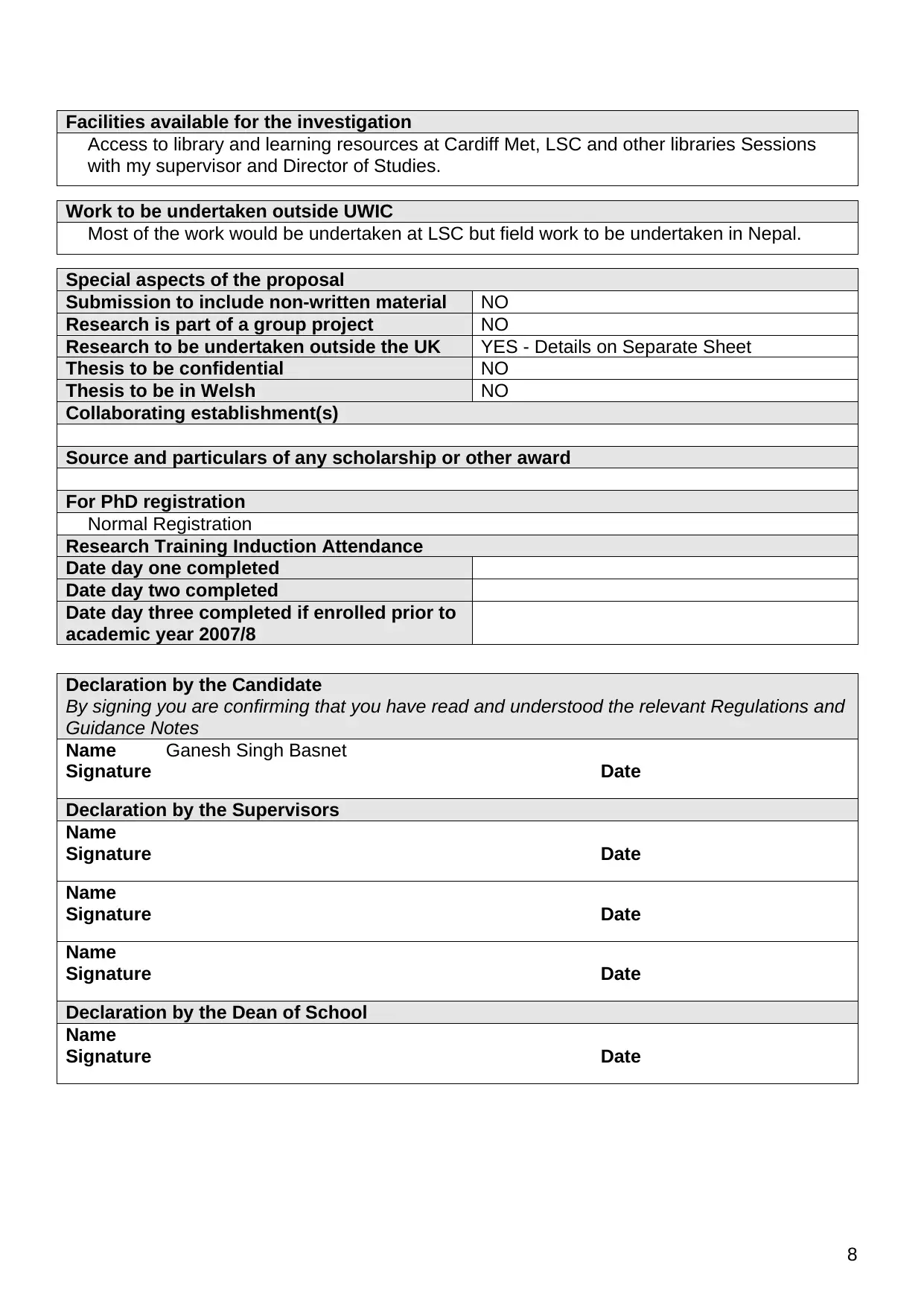
8
Facilities available for the investigation
Access to library and learning resources at Cardiff Met, LSC and other libraries Sessions
with my supervisor and Director of Studies.
Work to be undertaken outside UWIC
Most of the work would be undertaken at LSC but field work to be undertaken in Nepal.
Special aspects of the proposal
Submission to include non-written material NO
Research is part of a group project NO
Research to be undertaken outside the UK YES - Details on Separate Sheet
Thesis to be confidential NO
Thesis to be in Welsh NO
Collaborating establishment(s)
Source and particulars of any scholarship or other award
For PhD registration
Normal Registration
Research Training Induction Attendance
Date day one completed
Date day two completed
Date day three completed if enrolled prior to
academic year 2007/8
Declaration by the Candidate
By signing you are confirming that you have read and understood the relevant Regulations and
Guidance Notes
Name Ganesh Singh Basnet
Signature Date
Declaration by the Supervisors
Name
Signature Date
Name
Signature Date
Name
Signature Date
Declaration by the Dean of School
Name
Signature Date
Facilities available for the investigation
Access to library and learning resources at Cardiff Met, LSC and other libraries Sessions
with my supervisor and Director of Studies.
Work to be undertaken outside UWIC
Most of the work would be undertaken at LSC but field work to be undertaken in Nepal.
Special aspects of the proposal
Submission to include non-written material NO
Research is part of a group project NO
Research to be undertaken outside the UK YES - Details on Separate Sheet
Thesis to be confidential NO
Thesis to be in Welsh NO
Collaborating establishment(s)
Source and particulars of any scholarship or other award
For PhD registration
Normal Registration
Research Training Induction Attendance
Date day one completed
Date day two completed
Date day three completed if enrolled prior to
academic year 2007/8
Declaration by the Candidate
By signing you are confirming that you have read and understood the relevant Regulations and
Guidance Notes
Name Ganesh Singh Basnet
Signature Date
Declaration by the Supervisors
Name
Signature Date
Name
Signature Date
Name
Signature Date
Declaration by the Dean of School
Name
Signature Date
1 out of 8
Related Documents
Your All-in-One AI-Powered Toolkit for Academic Success.
+13062052269
info@desklib.com
Available 24*7 on WhatsApp / Email
![[object Object]](/_next/static/media/star-bottom.7253800d.svg)
Unlock your academic potential
Copyright © 2020–2026 A2Z Services. All Rights Reserved. Developed and managed by ZUCOL.





